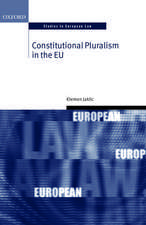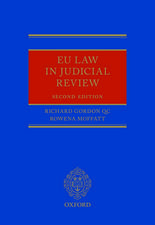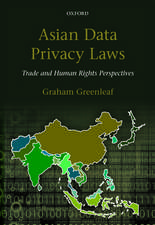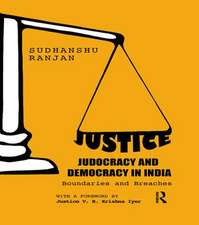Minorities and Nationalism in Turkish Law: Cultural Diversity and Law
Autor Derya Bayiren Limba Engleză Paperback – 28 noi 2016
| Toate formatele și edițiile | Preț | Express |
|---|---|---|
| Paperback (1) | 469.34 lei 6-8 săpt. | |
| Taylor & Francis – 28 noi 2016 | 469.34 lei 6-8 săpt. | |
| Hardback (1) | 1117.88 lei 6-8 săpt. | |
| Taylor & Francis – 10 ian 2013 | 1117.88 lei 6-8 săpt. |
Din seria Cultural Diversity and Law
-
 Preț: 469.34 lei
Preț: 469.34 lei -
 Preț: 489.26 lei
Preț: 489.26 lei -
 Preț: 489.26 lei
Preț: 489.26 lei -
 Preț: 469.34 lei
Preț: 469.34 lei - 14%
 Preț: 338.33 lei
Preț: 338.33 lei -
 Preț: 469.34 lei
Preț: 469.34 lei - 14%
 Preț: 338.33 lei
Preț: 338.33 lei - 19%
 Preț: 258.15 lei
Preț: 258.15 lei - 20%
 Preț: 259.98 lei
Preț: 259.98 lei -
 Preț: 489.26 lei
Preț: 489.26 lei - 21%
 Preț: 258.15 lei
Preț: 258.15 lei - 21%
 Preț: 258.15 lei
Preț: 258.15 lei -
 Preț: 489.26 lei
Preț: 489.26 lei - 14%
 Preț: 338.33 lei
Preț: 338.33 lei - 16%
 Preț: 338.33 lei
Preț: 338.33 lei -
 Preț: 387.75 lei
Preț: 387.75 lei -
 Preț: 388.13 lei
Preț: 388.13 lei - 21%
 Preț: 256.87 lei
Preț: 256.87 lei - 21%
 Preț: 258.70 lei
Preț: 258.70 lei -
 Preț: 388.34 lei
Preț: 388.34 lei - 18%
 Preț: 1000.27 lei
Preț: 1000.27 lei
Preț: 469.34 lei
Nou
89.82€ • 97.53$ • 75.45£
Carte tipărită la comandă
Livrare economică 23 aprilie-07 mai
Specificații
ISBN-10: 113827884X
Pagini: 320
Dimensiuni: 156 x 234 mm
Greutate: 0.45 kg
Ediția:1
Editura: Taylor & Francis
Colecția Routledge
Seria Cultural Diversity and Law
Locul publicării:Oxford, United Kingdom
Recenzii
NETSOL (New Trends in Social and Liberal Sciences), Vol I, Issue 1, 2016, pp 47-54
`Bayir offers us an immensely thorough, provocative book, which will surely be a resource to all scholars of the project of Turkish modernity and its discontents.’
International Journal of Tukish Studies, Vol. 20, No. 1/2, January 1, 2014
`Bayır’s study must be celebrated as unprecedented and an enrichment of legal literature… [her] experience as an attorney who litigated landmark cases before the ECtHR is transmitted in many aspects throughout the whole reading. Her attention toward detail is most apparent by the vast quantity of sources used in this study. At many times her arguments are not merely supported by codes and case law, but include parliamentary discussions and explanatory notes as well. This attribute makes the reading at times breath-taking and astonishing, at times shocking and provocative. The extent of legal scrutiny of this subject remains unprecedented. Hopefully, future policymakers will analyze with due diligence Derya Bayır’s Minorities and Nationalism in Turkish Law.’
Kurdish Studies,Vol 2, No 1 (2014)
’If you too want to get an amazing and detailed insight into the history of minorities in Turkey from a legal perspective and the current state of affairs, I strongly recommend this book’.
Kurdishmatters
'This book is a significant contribution to our understanding of mentalities and contexts, events and processes that have informed the Turkish Republic in its management of internal complexities. It makes Turkish law more accessible to a wider public and implicitly outlines better, more human rights-friendly options for a management process that would prospectively enhance the reputation of the Turkish state.'
Patrick Thornberry, Keele University, UK
'This book makes an important contribution to our understanding of how the Turkish Republic manages diversity as well as the treatment of ethnic and religious minorities in the Turkish legal system.'
Maleiha Malik, University of London, UK
’This timely book examines the ways laws and the judiciary have discriminated against minorities in modern Turkey. It documents skilfully how nationalist, unitary policies of the state have been and continue to be supported by legislation and the courts.’
Åževket Pamuk, London School of Economics and Political Science, UK
’A comprehensive yet nuanced discussion of the cunning use of law at the expense of minorities in Turkey - gruesome story, riveting reading ...’
Umut Ozkirimli, Lund University, Sweden
'Overall, this book provides an insightful, comprehensive and nuanced analysis of minorities and nationalism in Turkey. Its comprehensive content and richness of sources significantly inform the readers on minorities, minority rights, nationalism and most importantly the legal framework on minority rights in Turkey...the book is highly recommended... '
Changing Turkey in a Changing World
`Bayir’s work presents an enlightening and detailed analysis of the evolution of the Turkish legal system’s posture toward minorities from its foundation in ideals expressed in the Ottoman Empire to the progression of the Turkish Republic.'
NETSOL (New Trends in Social and Liberal Sciences), Vol I, Issue 1, 2016, pp 47-54
`Bayir offers us an immensely thorough, provocative book, which will surely be a resource to all scholars of the project of Turkish modernity and its discontents.’
International Journal of Tukish Studies, Vol. 20, No. 1/2, January 1, 2014
`Bayır’s study must be celebrated as unprecedented and an enrichment of legal literature… [her] experience as an attorney who litigated landmark cases before the ECtHR is transmitted in many aspects throughout the whole reading. Her attention toward detail is most apparent by the vast quantity of sources used in this study. At many times her arguments are not merely supported by codes and case law, but include parliamentary discussions and explanatory notes as well. This attribute makes the reading at times breath-taking and astonishing, at times shocking and provocative. The extent of legal scrutiny of this subject remains unprecedented. Hopefully, future policymakers will analyze with due diligence Derya Bayır’s Minorities and Nationalism in Turkish Law.’
Kurdish Studies,Vol 2, No 1 (2014)
`Bayir offers us an immensely thorough, provocative book, which will surely be a resource to all scholars of the project of Turkish modernity and its discontents.’
International Journal of Tukish Studies, Vol. 20, No. 1/2, January 1, 2014
`Bayır’s study must be celebrated as unprecedented and an enrichment of legal literature… [her] experience as an attorney who litigated landmark cases before the ECtHR is transmitted in many aspects throughout the whole reading. Her attention toward detail is most apparent by the vast quantity of sources used in this study. At many times her arguments are not merely supported by codes and case law, but include parliamentary discussions and explanatory notes as well. This attribute makes the reading at times breath-taking and astonishing, at times shocking and provocative. The extent of legal scrutiny of this subject remains unprecedented. Hopefully, future policymakers will analyze with due diligence Derya Bayır’s Minorities and Nationalism in Turkish Law.’
Kurdish Studies, Vol 2, No 1 (2014)
’If you too want to get an amazing and detailed insight into the history of minorities in Turkey from a legal perspective and the current state of affairs, I strongly recommend this book’.
Kurdishmatters
'This book is a significant contribution to our understanding of mentalities and contexts, events and processes that have informed the Turkish Republic in its management of internal complexities. It makes Turkish law more accessible to a wider public and implicitly outlines better, more human rights-friendly options for a management process that would prospectively enhance the reputation of the Turkish state.'
Patrick Thornberry, Keele University, UK
'This book makes an important contribution to our understanding of how the Turkish Republic manages diversity as well as the treatment of ethnic and religious minorities in the Turkish legal system.'
Maleiha Malik, University of London, UK
’This timely book examines the ways laws and the judiciary have discriminated against minorities in modern Turkey. It documents skilfully how nationalist, unitary policies of the state have been and continue to be supported by legislation and the courts.’
Åževket Pamuk, London School of Economics and Political Science, UK
’A comprehensive yet nuanced discussion of the cunning use of law at the expense of minorities in Turkey - gruesome story, riveting reading ...’
Umut Ozkirimli, Lund University, Sweden
'Overall, this book provides an insightful, comprehensive and nuanced analysis of minorities and nationalism in Turkey. Its comprehensive content and richness of sources significantly inform the readers on minorities, minority rights, nationalism and most importantly the legal framework on minority rights in Turkey...the book is highly recommended... '
Changing Turkey in a Changing World
Cuprins
Notă biografică
Dr Bayır has extensive experience litigating before the European Court of Human Rights, including the landmark case of Güveç v. Turkey.
Currently, Dr Bayır is an MSCA European Postdoctoral Fellow at the Saxo Institute, University of Copenhagen, where her research focuses on minority petitions to the League of Nations, expanding her expertise into historical international legal systems and their impact on minority rights.
Dr Bayır’s research interests encompass international legal history, human and minority rights, ethnoreligious diversity in legal systems, nationalism, Ottoman pluralism, Kurdish studies, federal and autonomous legal systems, and linguistic rights. Her work contributes to broader discussions on the role of law in shaping identity and governance in diverse societies.
Descriere
Examining the on-going dilemma of the management of diversity in Turkey from a historical and legal perspective, this book argues that the state's failure to accommodate ethno-religious diversity is attributable to the founding philosophy of Turkish nationalism and its heavy penetration into the socio-political and legal fibre of the country. It examines the articulation and influence of the founding principle in law and in the higher courts' jurisprudence in relation to the concepts of nation, citizenship, and minorities. In so doing, it adopts a sceptical approach to the claim that Turkey has a civic nationalist state, not least on the grounds that the legal system is generously littered by references to the Turkish ethnie and to Sunni Islam. Also arguing that the nationalist stance of the Turkish state and legal system has created a legal discourse which is at odds with the justification of minority protection given in international law, this book demonstrates that a reconstruction of the founding philosophy of the state and the legal system is necessary, without which any solution to the dilemmas of managing diversity would be inadequate. Adopting an interdisciplinary approach, this timely book will interest those engaged in the fields of Middle Eastern, Islamic, Ottoman and Turkish studies, as well as those working on human rights and international law and nationalism.















